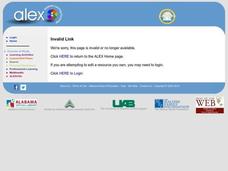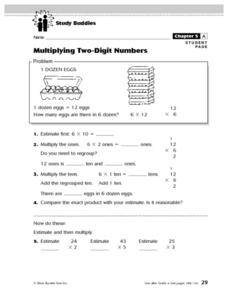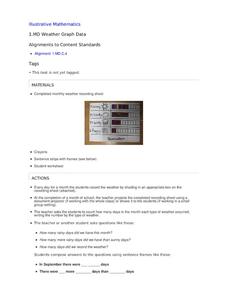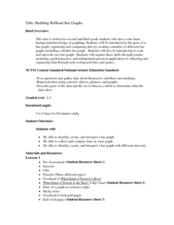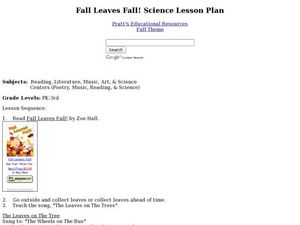Curated OER
Equivalent Fraction Paper Strips
Young learners compare the relative values of fractions by making physical representations. They fold and label strips of paper that are equal in length to represent "one whole" and the equal parts that fractions represent. Also, they...
Alabama Learning Exchange
Understanding Fractions
Young learners explore fractions and demonstrate parts of a whole by using a candy bar and a piece of paper and dividing both into equal parts. Included is a worksheet that requires youngsters to color in half of each polygon shape. Some...
Curated OER
Study Buddies: Multiplying Two-Digit Numbers
In this math homework worksheet, young scholars will solve a 2 digit multiplication problem with parental support. Students will follow a step-by-step process and "Coach's Notes" are provided for the parent helper.
Curated OER
Telling Time, Part 2
Compare time on an analog clock and a digital clock with a learning exercise that prompts third graders to write the given times into both clocks. An example at the top of the page demonstrates how to write the time for both clocks. A...
Illustrative Mathematics
Measure Me!
How many unifix cubes tall are you? If you're not sure, then perform this math activity with your class and find out. Working in pairs, young mathematicians make measuring sticks out of unifix cubes in order to determine the length of...
Curated OER
Spoonfuls, Cupfuls and Handfuls
Explore the use of non-standard units for measuring volume with elementary learners. They fill a container and count the number used using cups, spoons, and bottles, build with blocks and count the number of blocks used, and compare and...
Illustrative Mathematics
Weather Graph Data
Teaching young mathematicians about collecting and analyzing data allows for a variety of fun and engaging activities. Here, children observe the weather every day for a month, recording their observations in the form of a bar graph....
Curated OER
Estimate How Many Seeds Are In a Fruit or Vegetable
Help mathematicians estimate how many seeds are in a given vegetable or fruit. They are divided into pairs and estimate the amount of seeds in a whole fruit without seeing the inside. They then cut the fruit or vegetable in half and...
Illustrative Mathematics
How Long
It won't take young mathematicians long to learn how to measure length with this fun, hands-on activity. Working in pairs, children use Unifix® or snap cubes to measure and record the lengths of different classroom objects. To extend the...
Curated OER
Bar Graphs
Introduce scholars to bar graphs and data analysis through analyzing these visual examples. First, they look at a pictograph of fruit types and answer five observation questions. There is one done for them as an example. Learners do the...
Illustrative Mathematics
Representing Half of a Circle
Geometric shapes make great visual models for introducing young mathematicians to the concept of fractions. Looking at a series of four circles, students are asked to determine whether or not one half of each circle is shaded. To support...
Curated OER
Building Brilliant Bar Graphs
Everything you need for a mini-unit on bar graphs is included in this lesson plan! It outlines three lessons and includes worksheets. Learners taste pretzels, shoot baskets (switching off hands), and grab candy, graphing results...
Baylor College
There's Something in the Air
Clever! In order to compare indoor and outdoor dispersal rates for the movement of gases and particles through air, collaborators will participate in a classroom experiment. Set up a circular grid and set young scholars on lines that are...
Curated OER
Pumpkin Problems
Students participate in a lesson that has the intention of working on estimation skills. They use pumpkins to estimate the number of seeds are inside. They collect data for each pumpkin and compare it to the estimation. Students question...
Curated OER
Compare and Arrange Whole Numbers Up to 100
Number whizzes investigate integers by arranging them in a specific order. They utilize whole numbers which are given to them and then put them in order up to 100. They also practice using "greater than" or "lesser than" symbols.
Pennsylvania Department of Education
Comparing Sets
Students count back with cubes to model subtraction problems. In this subtraction lesson plan, students compare sets of problems and record their results in a table.
Curated OER
Comparisons
For this comparing number worksheet, learners solve 12 problems in which two 3 digit numbers are compared with the correct sign: <, >, or =.
Curated OER
Comparing Shamrock Numbers (H)
In this math worksheet, students analyze and compare the three numbers in each of 6 shamrocks. Students circle the greatest number in each shamrock. Numbers are between 50 and 100.
Curated OER
Comparing Shamrock Numbers (B)
In this math instructional activity, students examine 6 shamrocks, each with 3 numbers. Students circle the number that is the greatest. All numbers are between 50 and 100.
Curated OER
Measuring Scavenger Hunt
Students participate in a measuring scavenger hunt. Students choose items around the room to estimate and measure. Students try measuring with their hands and compare with other students who did the same. Students discuss why their...
Curated OER
Counting Chart
Elementary learners discover counting through a counting chart. In this math lesson, students identify numbers 1-100. They then point or recite their counting numbers.
Curated OER
Add and Compare enrichment 10.5
In this addition worksheet, students add the ones columns and fill in the carry squares, add the tens, then order the sums. Students solve ten problems.
Curated OER
Fall Leaves Fall
Students explore fall leaves. In this leaf lesson, students collect leaves to investigate. Students also measure, compare and contrast, draw and look at leaves through a magnifying glass. Students sing songs and use movement in this...
Curated OER
Soak It Up
Students role play where they assume the role of business executives who must decide which of three prototypes of paper towels would be the best buy for consumers. Students compare three products to determine the best value by using...



